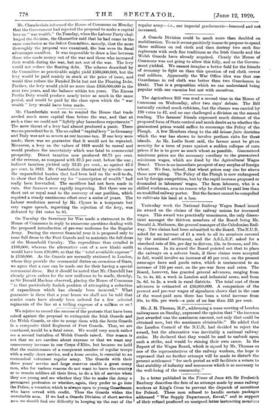Yesterday week the National Railway Wages Board 'issued its award
on the claims of the railway unions for.increased wages. This award was practically unanimous, the only dissen- tient amongst the thirteen members of the Board being Mr. Donald A..Matheson, the general manager of the Caledonian Rail- way. Two claims had been submitted to the Board. The N.U.R. asked for an increase of £1 a week to all its members covered by the national settlement, and the A.S.L.E.F. asked for a standard rate of 20s. per day to drivers, 15s. to firemen, and 10s. to cleaners. In its award the Board pointed out that to place the railways on a solvent basis, if these claims were accepted in full, would involve an increase of 40 per cent. on the present passenger fares and goods rates, which is tantamount to an increase of 110 per cent. on the pre-war fares and rates. The Board, .however, has granted general advances, ranging from 7s. to 4s. 6d. a week in. London and industrial areas, and from 3s. 6d. to 2s. a week in rural districts. The total cost of these advances is estimated at £10,000,000. A comparison of the present and pre-war wages of signalmen shows that in the case of the worst-paid men there has been a total increase from 20s. to 65s. per week—a gain of no less than 225 per cent.






































 Previous page
Previous page